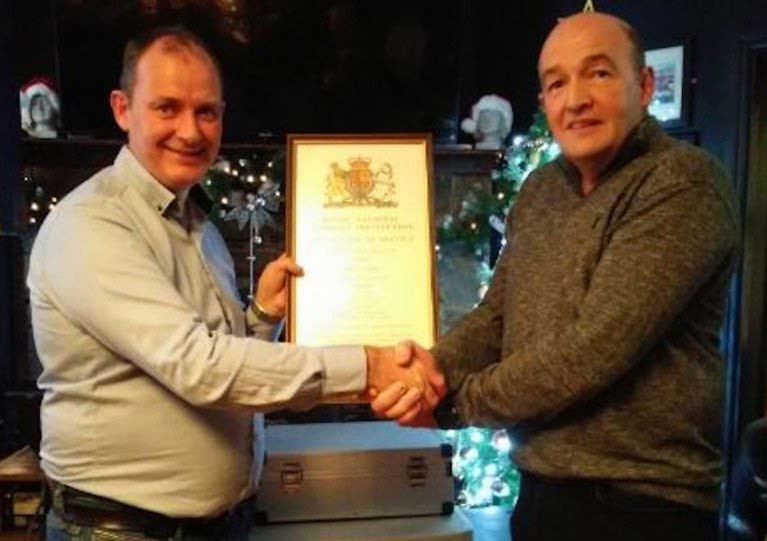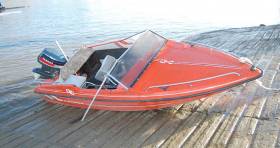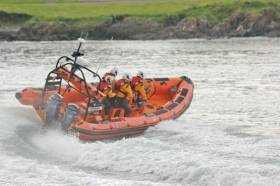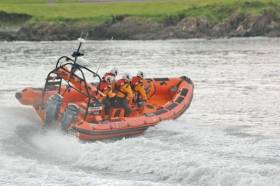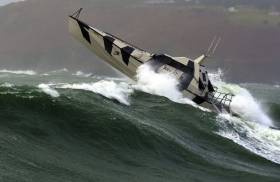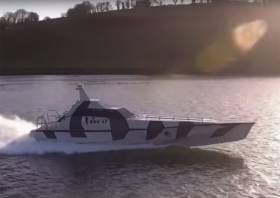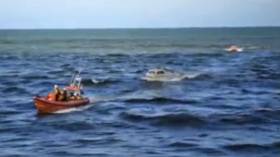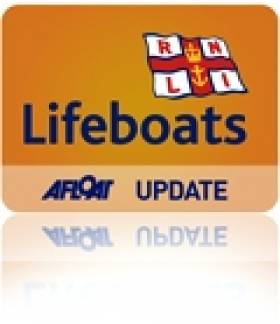Displaying items by tag: Speedboat
Submerged Speed Boat Causes Concern on Lough Neagh
Shortly before 9 am yesterday, HM Coastguard received a call from a concerned member of the public who had seen a submerged speed boat with potential casualties in the water in Castor Bay in the south east corner of Lough Neagh.
Lifeboats from Lough Neagh Rescue – a voluntary search and rescue organisation based on the shores of Lough Neagh, the largest freshwater lake in the British Isles, quickly made way to the area and found the vessel close to the shore but it had taken on water. On initial search, no casualties appeared to be in the water. The crew moored the lifeboat at a nearby fishing quay and searched the shoreline, where they found parts of the boat with a few other items, including life jackets.
 The speed boat was towed to the local fishing quay
The speed boat was towed to the local fishing quay
Further information came from the Coastguard that the occupants of the boat had run aground last night and notified the PSNI but did not contact the Coastguard.
The speed boat was towed to the local fishing quay. Lough Neagh Rescue advises, "If you are out on the water and something like this happens and you don't require emergency assistance make sure and notify the Coastguard".
The Importance of Sea Safety – A Salutary Speedboat Story
With most boats either safely ashore or secured in safe mooring berthages, this is a month to prepare for the season ahead and one of those aspects, about which I feel particularly strongly is safety on the water. There is an obligation on all of us who enjoy watersports to exercise responsibility, to be able to look after ourselves and to ensure our crews do likewise. We also have a responsibility not to be the cause of unnecessary call-outs to the rescue services.
To underline these points, I have the story this week from a lifeboatman with 32 years’ experience at Youghal on the East Cork coastline.
During the 17th century, Youghal was one of Ireland's main ports, far more important than Cork Harbour, which was described officially then as “a port near Youghal.”
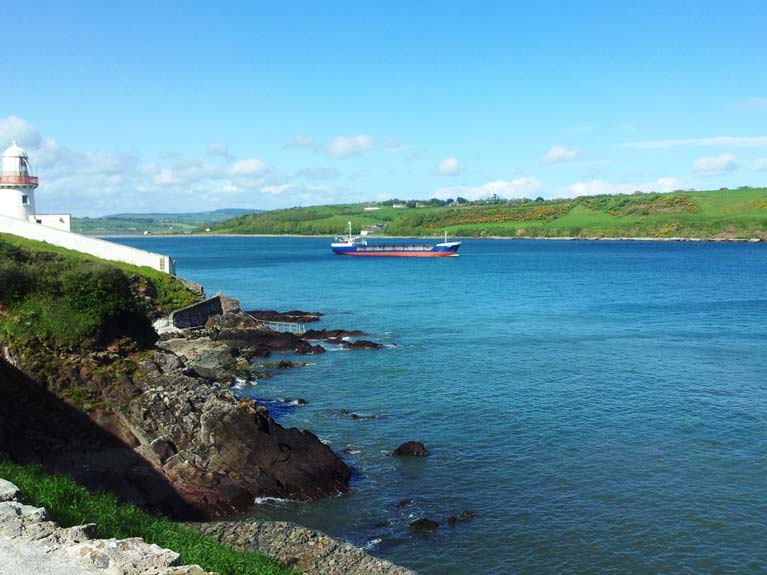 Youghal Lighthouse and Harbour entrance
Youghal Lighthouse and Harbour entrance
That historical record of the respective ports may have some association with the confusion of two-speed boat crew to whom navigation was an art they did not have the knowledge or the resources to understand when the Youghal lifeboatman came upon their confusion.
The story is told by John Innes who has retired after 32 years’ service with Youghal lifeboat. He was Helm of three Atlantic class lifeboats at Youghal - the Atlantic 21 Marjory Turner; the Atlantic 75 Patricia Jennings and the Youghal station’s current Atlantic 85 Gordon and Phil. He also served as Lifeboat Training Co-ordinator from 2001-2009 and again between 2016-2017. During his RNLI service, John was involved in saving 34 lives at sea.
Doing a bit of research about Youghal in preparing this week’s Podcast I discovered that nuns once made sure that the light was maintained on Youghal Lighthouse. It was a duty of the nunnery of the Chapel of St. Anne’s from 1202 until the Reformation in the 1530s when the nunnery had to be abandoned as was the light. Construction of the present lighthouse, designed by George Halpin, began in 1848 and it was brought into operation in 1852.
I also discovered that there was a climate incident described in the historical records as a "great convulsion of nature" in the province of Munster in the year 830, in which over a thousand people were killed in a “fierce storm.” One of the storm’s effects was to change the flow of the famous River Blackwater which flows through Youghal. This formed a new entrance to Youghal Harbour, the current one – which confused those two speedboat men!
#Speedboat - A man has been sentenced to six years in prison for the manslaughter of a woman who died after his speedboat crashed in London three years agp.
According to The Guardian, Jack Shepherd (31) was absent from sentencing at the Old Bailey after skipping bail, and police currently have a warrant out for his arrest.
The jurors heard that in December 2015, Shepherd took his date Charlotte Brown (24) to his speedboat on the River Thames while both were under the influence of alcohol, and allowed her to drive the vessel at “full throttle”.
The boat crashed into a submerged log before capsizing and throwing both Shepherd and Brown into the river.
Brown showed symptoms of hypothermia and cardiac arrest when she was recovered from the water, and was pronounced dead later.
Neither Brown nor Shepherd was wearing a lifejacket, and Shepherd — who had previously been pulled over a number of times for speeding on the river — admitted in a police interview that he did not inform Brown, who had no boating experience, about the safety devices on board.
Police also said the speedboat itself had a number of defects, including a ‘wobble’ in its steering.
Mail Online has video recorded by Brown on her phone of part of the pair’s speedboat trip, in which she can be heard commenting that Shepherd was “going so fast”.
Judge Richard Marks QC, in his sentencing remarks, said Shepherd had a “totally cavalier attitude to safety”. The Guardian has more on the story HERE.
#Missing - Police Scotland confirmed that two bodies were recovered from the Irish Sea in the search for a speedboat missing off the Scottish coast, according to Yachting & Boat World.
RNLI lifeboats and coastguard volunteers from Northern Ireland were involved in the search for the speedboat and its two occupants off Dumfries and Galloway, as reported yesterday on Afloat.ie.
#Missing - RNLI lifeboats from Bangor and Donaghadee have joined the search for a speedboat with two men missing off the Scottish coast, as BBC News reports.
Coastguard volunteers from Bangor are also part of the emergency operation launched last night (Saturday 6 May) when the two men failed to return to Port Logan in Dumfries and Galloway.
Searches for the missing vessel, thought to be an 18ft black Fletcher speedboat, are concentrated off the Mull of Galloway for the time being.
BBC News has more on the story HERE.
Thunder Child Takes On Storm Doris In Cork Harbour
#ThunderChild - Storm Doris’s high winds on Thursday (2 February) made the perfect conditions for testing Safehaven Marine’s latest state-of-the-art naval patrol vessel in Cork Harbour, as the Irish Examiner reports.
Test pilot Ciaran Monks was at the helm of Thunder Child amid 50-knot winds and six-metre waves in what crew member Mary Power said were “by far the roughest conditions she’s encountered since her launch before Christmas”.
As previously reported on Afloat.ie, Thunder Child was launched for tests in December in preparation for an attempt to break the record for the fastest circumnavigation of Ireland — with an open-sea loop via Rockall to boot.
The Irish Examiner has more on the story HERE.
Safehaven Marine's sleek Thunder Child interceptor tackling 6m waves in 50knt winds at the mouth of #Cork Harbour today #StormDoris pic.twitter.com/2yj8tZIuOx
— Eoin English (@EoinBearla) February 2, 2017
Safehaven’s ‘Thunder Child’ Put Through Its Paces In Stormy Cork Harbour
#ThunderChild - Stormy winter seas made the perfect proving ground for a new state-of-the-art naval patrol and rescue vessel tested in Cork Harbour recently, as the Irish Examiner reports.
But it’s just the beginning for Thunder Child – the latest high-tech design from Cork-based Safehaven Marine, makers of the James Bond-style Interceptor, Barracuda – which was launched from the Port of Cork last month.
Safehaven’s managing director Frank Kowalski has his sights set on breaking the record for the fastest circumnavigation of Ireland — including a 1,000km open-sea loop around Rockall.
And considering the sleek wave-cutting vessel has already clocked speeds of over 100kph in testing, and is kitted out to handle the stormiest situations, it should be well up to the task of that challenging route.
The Irish Examiner has more on the story HERE.
Man Dies After Two Go Overboard From Speedboat In Irish Sea
#IrishSea - A man has died after going overboard from a speedboat in the Irish Sea off Aberystwyth in West Wales yesterday morning (Wednesday 31 August).
Aberystwyth RNLI launched its Atlantic class lifeboat at 9.30am to reports of an empty speedboat circling in Cardigan Bay about 500m offshore.
The volunteer crew were swift to the scene to pull two men from the water into the safety of the lifeboat, and treatment of one of the casualties began immediately.
However, as Wales Online reports, despite the best efforts of rescuers, the man sadly died, while his companion was last reported in a stable condition at Bronglais Hospital.
HM Coastguard later assisted the lifeboat volunteers in their inshore rescue boat to gain control of the speedboat and bring it in to the marina.
Teen Girl Dies In Devon Speedboat Capsize
#Devon - The Guardian reports on the death of a teenage girl who became trapped under a capsized speedboat in a Devon marina at the weekend.
Three others – the girl's father and two friends – required medical attention after the incident on Saturday 2 May in which the 5m speedboat they were travelling in overturned at Brixham Harbour in Torbay.
Police have appealed for witnessed to come forward as they investigate the circumstances surrounding the incident, which recalls the tragic RIB accident in Cornwall two years ago that killed Sky TV executive Nick Milligan and his daughter Emily.
Larne Lifeboats In Two Separate Call-Outs
#RNLI - Larne RNLI was called out for assistance on two separate occasions this past week.
On Thursday night 6 June, the volunteer lifeboat Dr John McSparran responded to a request by Belfast Coastguard to assist a lone yachtsman who had become disorientated in sea fog.
Weather conditions at the time were described as flat calm with no wind at all. However, a sea fog had come down in the evening, and the man on board - having left Girvan in Scotland en route to Glenarm Marina in an old gaffer to celebrate the Old Gaffers Association's Golden Jubilee - got into difficulty.
The casualty was located becalmed seven miles east of The Maidens Lighthouse. Lifeboat crew members Martin Agnew and Scott Leitch were put on board to assist after it was discovered that the casualty's outboard engine had failed and the gaffer was making no headway against the tide.
It was decided by Coxswain Frank Healy to tow the casualty to Glenarm, keeping the two crew members on board to assist. The vessels and crews arrived in Glenarm at 1.30am.
Two nights before, Larne RNLI assisted two men after their motor boat got into difficulty on Belfast Lough.
The volunteer crew launched their inshore lifeboat, the Hannahbella Ferguson, at 8.15pm following a request to assist the speed boat which had sustained engine failure off Muck Island.
Two men, both wearing lifejackets, were on board. Weather conditions at the time were described as good with a flat calm sea.
The casualty boat was subsequently towed safely to shore by the lifeboat to Portmuck Harbour.
Crew on this call out included helm Willie Evans, Martin Agnew and Jay Torbitt.



























